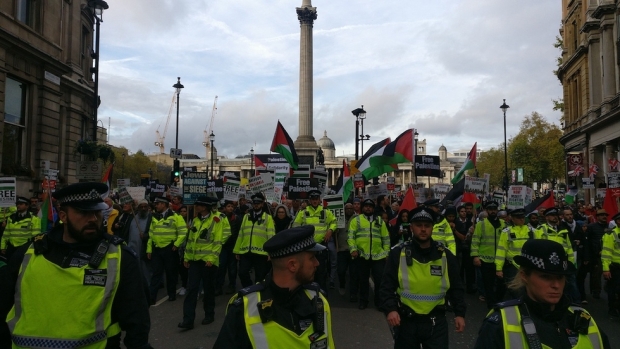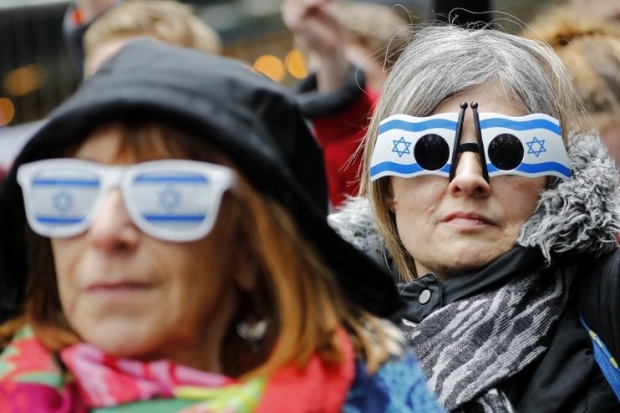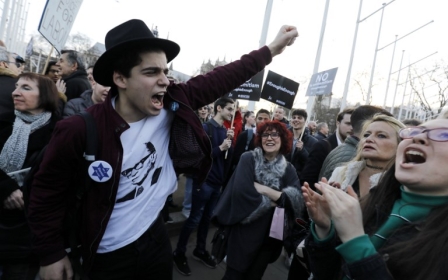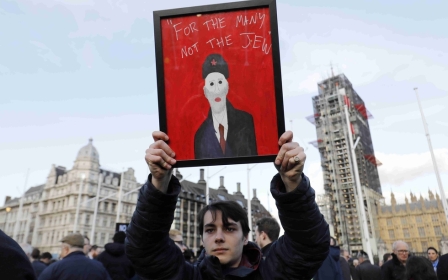Labour’s anti-Semitism scandal has spilled over into attacks on Palestine solidarity
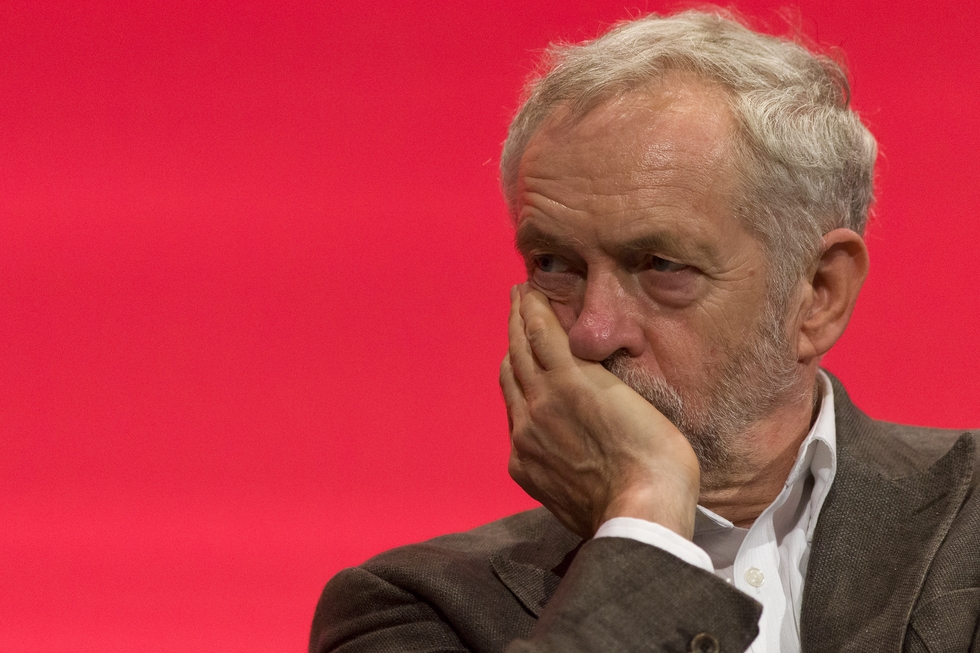
The British Labour party has been plagued by anti-Semitism scandals since Jeremy Corbyn was elected leader in September 2015. The party has faced a series of damaging allegations against members, councillors, MPs, and grandees such as former mayor of London Ken Livingstone. Labour is handling several cases concerning anti-Semitism - most of which predate Corbyn's leadership.
Solidarity under scrutiny
At the height of the crisis, Britain's largest Jewish communal bodies organised a demonstration outside Parliament to protest Labour's handling of anti-Semitism. Jewish religious leaders, public figures and Labour's own MPs have lined up to condemn the party. The majority of Labour members accept the problem is genuine and so does the leadership.
In an April article for the London Evening Standard, Corbyn apologised to the Jewish community for "hurt and distress caused" and identified two sources of anti-Semitism particular to the left and Labour. He called out conspiracy theories masquerading as critiques of capitalism that feed "hoary myths about 'Jewish bankers'".
Corbyn also took aim at a movement he has long been associated with. "Individuals on the fringes of the movement of solidarity with the Palestinian people can stray into anti-Semitic views," he wrote.
In recent months, the campaign to eradicate anti-Semitism from Labour's ranks has increasingly focused on the latter area.
Corbyn was accused of anti-Semitism by watchdog groups for criticising the Israeli army's conduct in shooting thousands of protesters at the Gaza fence
Scrutiny of Palestine solidarity activism has certainly been justified in some cases. In March, citizen journalist David Collier released a lengthy report detailing the activities of a private Facebook group named Palestine Live. The group contained numerous anti-Semitic posts including links to neo-Nazi sites, anti-Semitic cartoons, and suggestions that Israel was responsible for the 9/11 terror attacks.
The group's membership included high-profile activists and journalists, Labour MPs - and Corbyn. The revelations met with outrage and the Labour leader deleted his Facebook page soon after.
Other critiques of support for Palestinians have been less well-founded. Corbyn was accused of anti-Semitism by watchdog groups for criticising the Israeli army’s conduct in shooting thousands of protesters at the Gaza fence. Corbyn’s sons have been attacked for mild statements such as "Free Palestine" and "End the Occupation".
Stigmatising supporters
Prominent supporters of Palestinian rights with links to Labour have also been attacked and used as a stick with which to beat the party. For example, activist Gary Spedding, who has worked with Labour on anti-Semitism initiatives, was the subject of several anonymous hatchet jobs.
The Palestine Solidarity Campaign (PSC), which counts Corbyn among its patrons, has also become a target. Another report from David Collier found several examples of anti-Semitic posts from PSC activists and concluded "anti-Semitism is the fuel that primes the PSC engine." This prompted fresh calls for Corbyn to disavow the group, after Labour Friends of Israel Joan Ryan called for him to step down in 2017.
Many of the cases of racism unearthed by Collier were genuine, but the PSC cannot be easily dismissed as a home for racist cranks. This is the UK's largest body campaigning for Palestinian rights, on issues of legitimate concern from child prisoners to settlements, with thousands of members across dozens of branches. It is affiliated to many of Britain's largest trade unions, and has engaged with MPs across the political spectrum for decades.
To claim the PSC is illegitimate is to say the same of the Palestinian cause.
Political opponents
Collier is clear that is his view, that Palestine solidarity activism - or "Palestinianism" as he calls it - is a "cult" and a "viral ponzi scheme."
"'Palestinianism' is a disease that is anathema to freedom, to debate, to openness and to human rights," Collier blogged. "It will infect those who catch the disease with anti-Semitism just as it provides them with a denial mechanism to protest their innocence."
This highlights an issue that many of the charges of anti-Semitism against Palestine solidarity activists are coming from partisan political opponents rather than objective racism monitors. Collier is a longstanding Israel advocate and critic of Palestinian activism who has described his mission as "showing everybody how toxic our enemies are".
There has been no parallel scrutiny of hate speech in Israel advocacy, far less any suggestion that the field is discredited as a result, whereas pro-Palestinian activism is now suffering a crisis of legitimacy
Jonathan Hoffman, who has played a leading role in highlighting anti-Semitism among Palestinian supporters - including Corbyn - is a former board member of the Zionist Federation and a serial saboteur of Palestinian events.
Groups such as Friends of Israel chapters and the Israel Advocacy Movement have combined fighting anti-Semitism within Labour and Palestinian circles with pro-Israel advocacy, blurring the lines between the two causes and often treating them as interchangeable.
This has the effect of making Labour's anti-Semitism crisis a proxy battleground for the bitter argument that rages around the Israeli-Palestinian conflict, in which one side is taking the opportunity to discredit the other while bypassing and negating the political roots of disagreement.
They should be motivated in this task by recognition that any instance of anti-Semitism within their ranks is likely to be seized upon and presented as evidence that the pro-Palestinian movement is rotten to the core.
Hate speech in Israel advocacy
Sadly, eradicating hate speech is no simple task given that it has been a constant by-product of an intractable, hate-filled conflict that cuts along fault lines of race, religion, and culture. A glance at popular Israel advocacy forums shows it is not limited to one side.
The Zionist Federation UK Facebook page contains comments referring to Palestinians as "subhumans" and "evil made up people", with one post reading "Fakestinians...would slaughter their own mother if they had one." The Stand With Us page contains numerous references to Palestinians as "animals" and "savages".
One popular comment suggested "Napalm Gaza" and another taunts a victim of the Gaza fence shootings - "one leg will suit you buddy". A 2017 report on social media in Israel found that messages of anti-Arab racism were posted at a rate of just over one per minute, with frequent incitements to violence.
There has been no parallel scrutiny of hate speech in Israel advocacy, far less any suggestion that the field is discredited as a result, whereas pro-Palestinian activism is now suffering a crisis of legitimacy.
Shutdown
The foundations of Palestine solidarity activism are increasingly questioned and threatened.
Labour's trials have shone a harsh light on anti-Zionism, which is increasingly equated with anti-Semitism, including by government ministers and public figures such as historian Simon Schama. But to many Palestinians and supporters, anti-Zionism is a basic, obvious position against an ideology that has entailed their dispossession and subjugation.
A British court upheld the validity of this position in a 2011 tribunal that ruled "a belief in the Zionist project or an attachment to Israel or any similar sentiment cannot amount to a protected characteristic."
Arguments for a one-state solution are routinely characterised as calling for Israel's destruction and therefore racist, despite a binational state being a serious, longstanding proposition that has gained support from the Palestinian leadership as prospects for a just two-state solution fade, with little interest in reviving them from either the Israeli or US government.
The Boycott, Divestment, and Sanctions (BDS) movement - a key plank of the Palestinian-led nonviolent resistance strategy - is under growing pressure. Home Secretary Sajid Javid has attempted to ban councils from participating, and Labour Shadow Foreign Secretary Emily Thornberry has equated the movement with "bigotry".
Government ministers and Labour's Progress faction have also condemned use of the word "Apartheid" to describe the parallel legal systems applied to Israelis and Palestinians, although the term is a staple of discourse around the conflict invoked by observers including former Israeli president Ehud Barak, former secretary of state John Kerry, and Amnesty International.
A new definition
Anti-Semitism campaigners are pushing for Labour to adopt a new definition of anti-Semitism from the International Holocaust Remembrance Alliance (IHRA), already used by the British government, which contains criteria governing discussion on Israel.
The definition's examples of anti-Semitism include "applying double standards" to Israel "not expected...of any other democratic nation," and "denying the Jewish people their right to self-determination, e.g., by claiming that the existence of a State of Israel is a racist endeavour."
This formulation has been criticised by leading lawyers such as Hugh Tomlinson QC, who called it "unclear and confusing," and potentially detrimental to free speech.
That potential has been made plain by claims that criticism of the Israeli army for shooting protesters is anti-Semitic under the "double standards" clause, while the equation of Jewish self-determination with Zionism is also contentious and renders many critiques of Zionism illegitimate.
The clauses are also contradictory. Many scholars argue that other democratic nations such as the USA and Australia were formed as “racist endeavours” so to say the same of Israel need not involve double standards.
Global context
We should recognise that solidarity activists have reason to fear censure given the context of a global crackdown.
The BDS movement is increasingly legislated against in the US, where the American Civil Liberties Union is fighting to protect the right to boycott on First Amendment grounds. Groups such as Canary Mission are compiling blacklists of pro-Palestinian activists to damage their professional and social standing.
Germany has introduced laws targeting BDS activists, and France has adapted existing laws for the same purpose. French President Emmanuel Macron and German Chancellor Angela Merkel have both expressed the view that anti-Zionism is simply anti-Semitism.
The erasure of pro-Palestinian voices has echoes of erasures on the ground, of Palestinian land through settlement expansion, of Palestinian homes through demolitions, of Palestinian language through the Nation-State bill that strips Arabic of official language status, and Palestinian history through restrictions on commemorations of the Nakba.
The invalidation of support networks puts a vulnerable population in even greater jeopardy.
The Labour leadership promised to be a rare bulwark of solidarity with Palestinians among major Western political parties, with a career-long partisan for the cause in Jeremy Corbyn.
But that commitment is under growing pressure as pragmatic elements of the party fight to escape the toxic cloud of anti-Semitism scandals by almost any means necessary, from accepting the IHRA definition of anti-Semitism, to abandoning terms such as apartheid, to denouncing the boycott movement, and disavowing the PSC.
From that point it would be no great leap to drop the Palestinian cause entirely. Such a course of action would make life easier for the Labour Party, but harder for Palestinians and the global movement seeking justice for them.
- Kieron Monks is a London-based writer for outlets including CNN, The Guardian, and Prospect magazine, covering social movements, sports, and the intersection between them.
The views expressed in this article belong to the author and do not necessarily reflect the editorial policy of Middle East Eye.
Photo: Jeremy Corbyn on stage at the Labour Party conference in Brighton. September 27 2015 (AFP/Justin Tallis)
Middle East Eye propose une couverture et une analyse indépendantes et incomparables du Moyen-Orient, de l’Afrique du Nord et d’autres régions du monde. Pour en savoir plus sur la reprise de ce contenu et les frais qui s’appliquent, veuillez remplir ce formulaire [en anglais]. Pour en savoir plus sur MEE, cliquez ici [en anglais].



